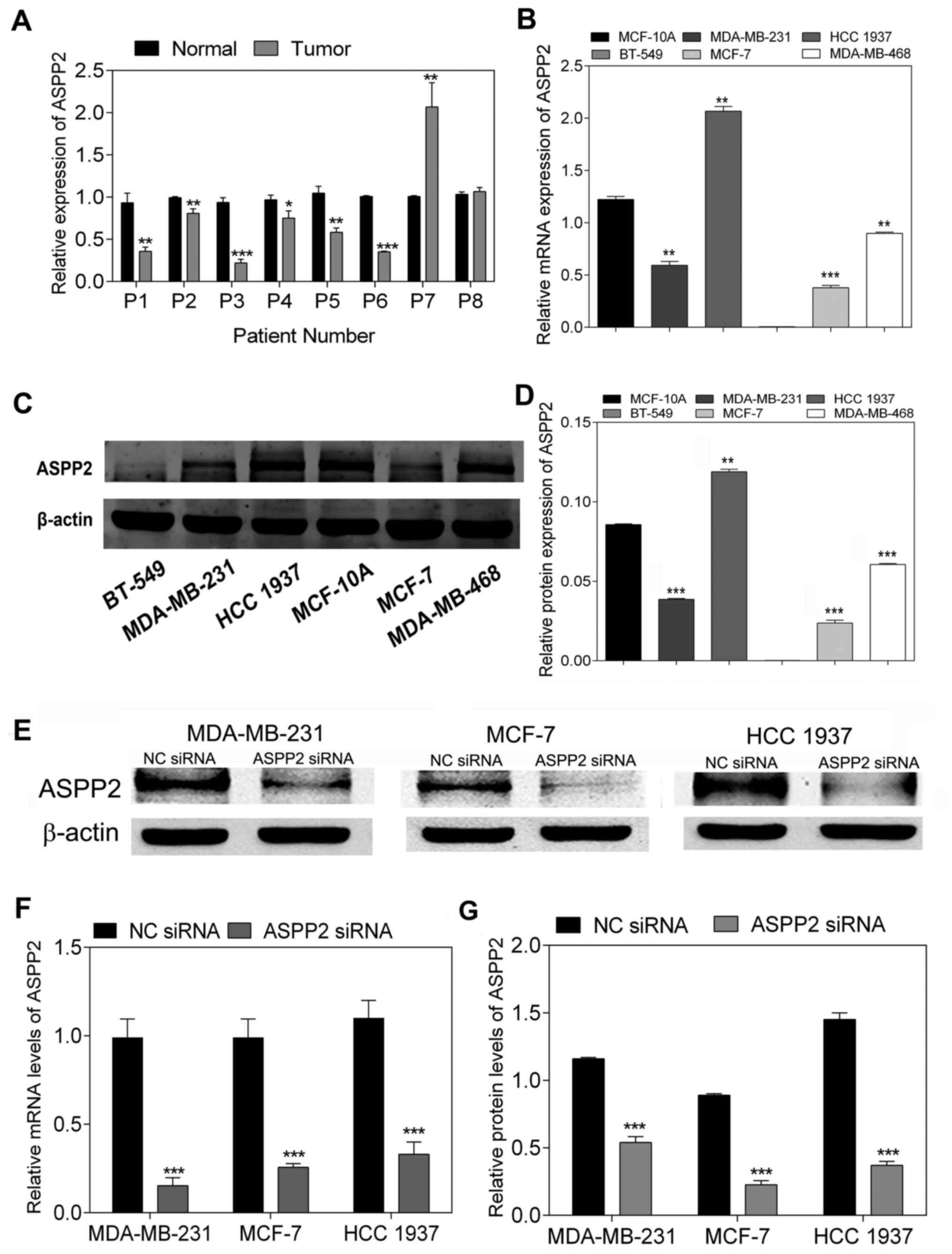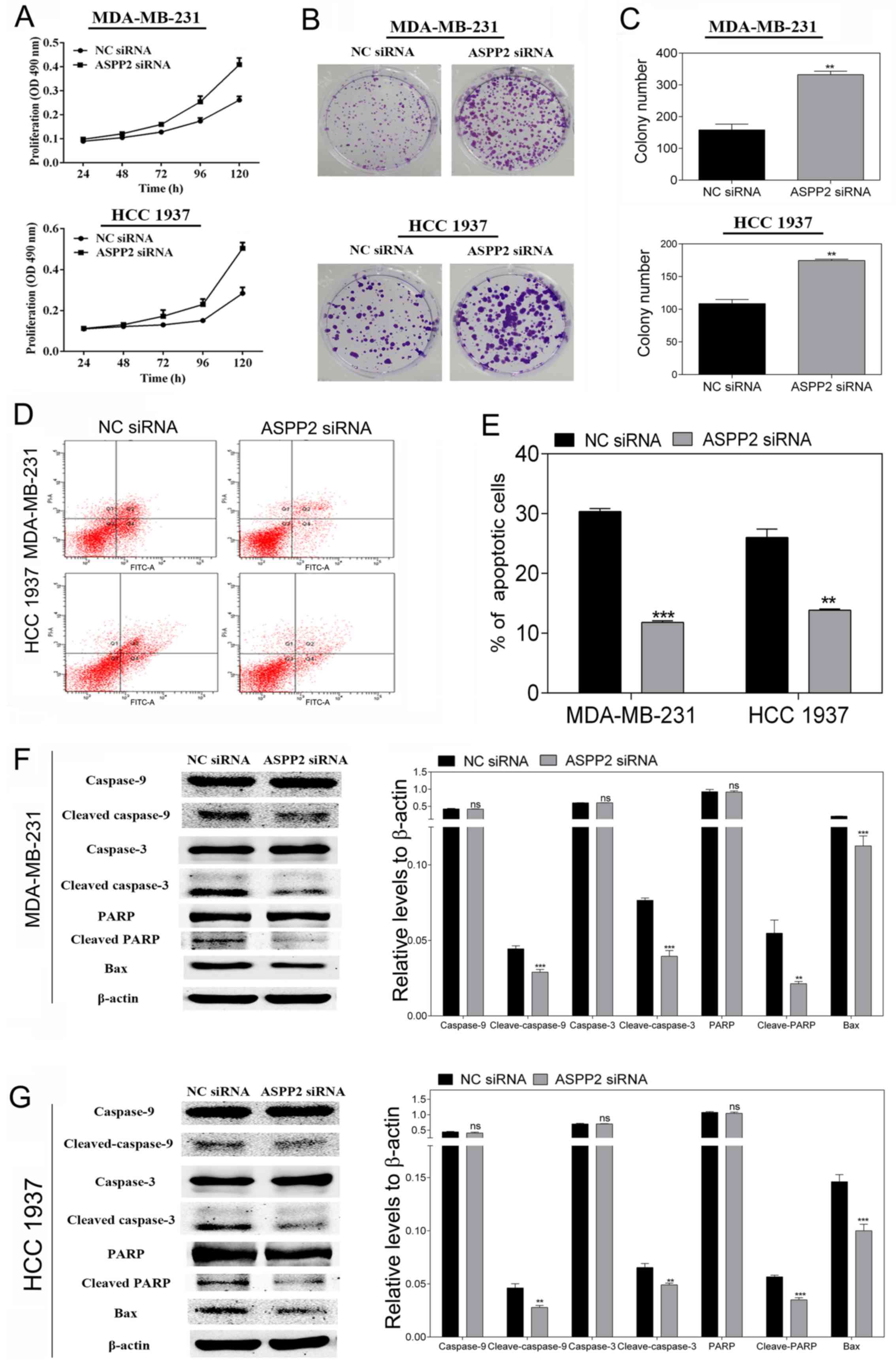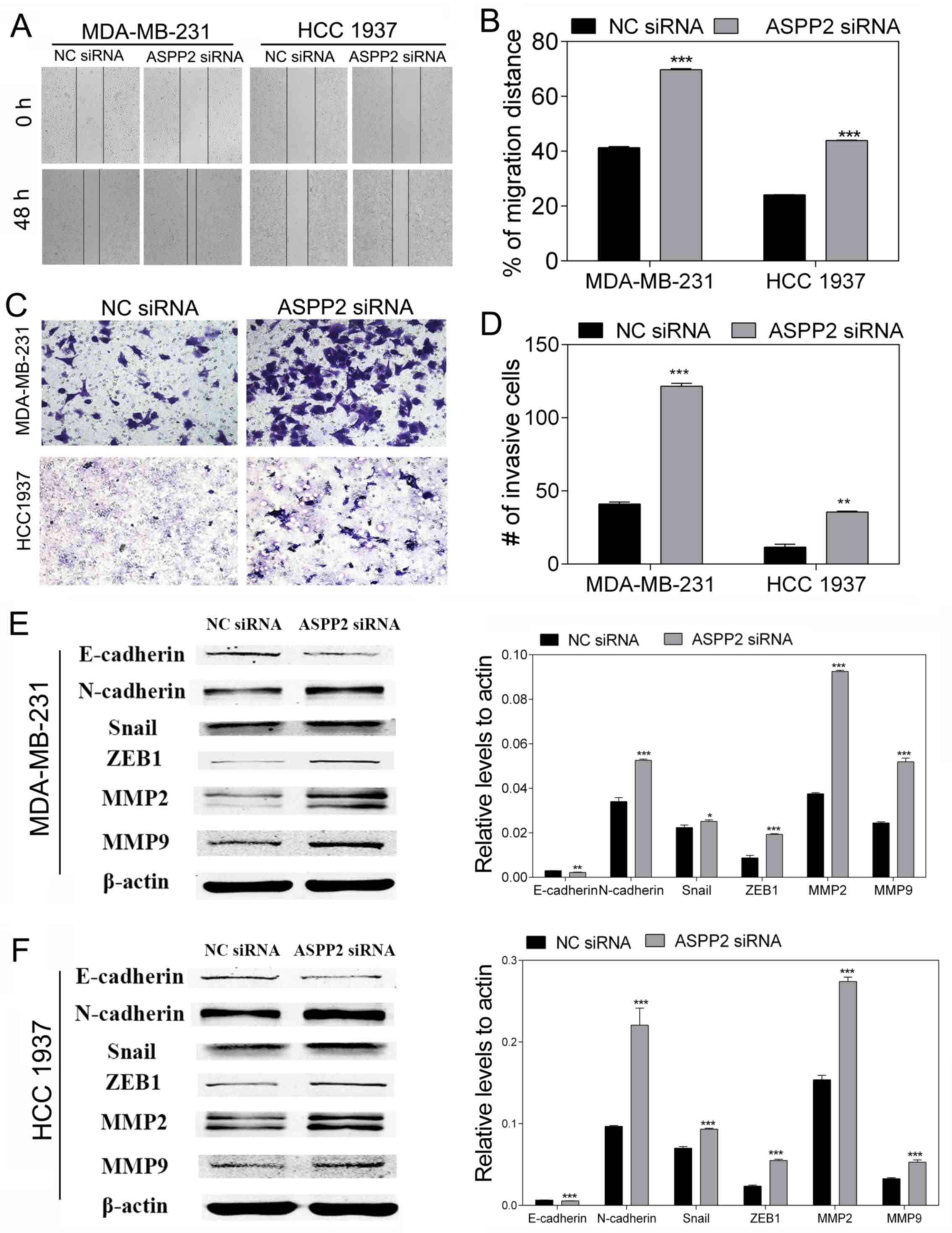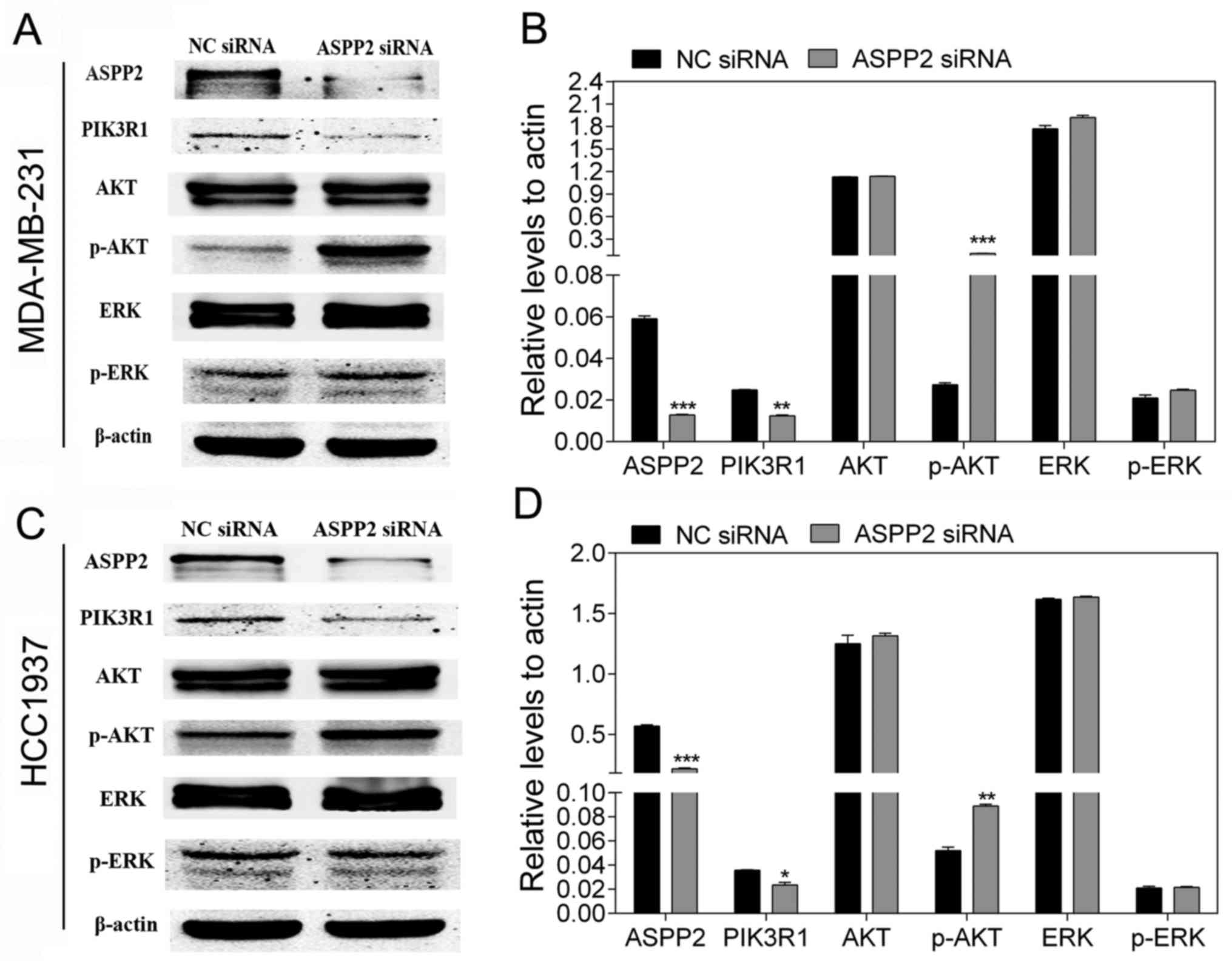|
1
|
Miller KD, Siegel RL, Lin CC, Mariotto AB,
Kramer JL, Rowland JH, Stein KD, Alteri R and Jemal A: Cancer
treatment and survivorship statistics, 2016. CA Cancer J Clin.
66:271–289. 2016. View Article : Google Scholar
|
|
2
|
Pal SK, Childs BH and Pegram M: Triple
negative breast cancer: Unmet medical needs. Breast Cancer Res
Treat. 125:627–636. 2011. View Article : Google Scholar
|
|
3
|
Mayer IA, Abramson VG, Lehmann BD and
Pietenpol JA: New strategies for triple-negative breast
cancer–deciphering the heterogeneity. Clin Cancer Res. 20:782–790.
2014. View Article : Google Scholar
|
|
4
|
Perou CM: Molecular stratification of
triple-negative breast cancers. Oncologist. 16(Suppl 1): 61–70.
2011. View Article : Google Scholar
|
|
5
|
Takahashi N, Kobayashi S, Jiang X,
Kitagori K, Imai K, Hibi Y and Okamoto T: Expression of 53BP2 and
ASPP2 proteins from TP53BP2 gene by alternative splicing. Biochem
Biophys Res Commun. 315:434–438. 2004. View Article : Google Scholar
|
|
6
|
Samuels-Lev Y, O’Connor DJ, Bergamaschi D,
Trigiante G, Hsieh JK, Zhong S, Campargue I, Naumovski L, Crook T
and Lu X: ASPP proteins specifically stimulate the apoptotic
function of p53. Mol Cell. 8:781–794. 2001. View Article : Google Scholar
|
|
7
|
Ahn J, Byeon IJ, Byeon CH and Gronenborn
AM: Insight into the structural basis of pro- and antiapoptotic p53
modulation by ASPP proteins. J Biol Chem. 284:13812–13822. 2009.
View Article : Google Scholar
|
|
8
|
Trigiante G and Lu X: ASPP [corrected] and
cancer. Nat Rev Cancer. 6:217–226. 2006. View Article : Google Scholar
|
|
9
|
Wang Z, Liu Y, Takahashi M, Van Hook K,
Kampa-Schittenhelm KM, Sheppard BC, Sears RC, Stork PJ and Lopez
CD: N terminus of ASPP2 binds to Ras and enhances Ras/Raf/MEK/ERK
activation to promote oncogene-induced senescence. Proc Natl Acad
Sci USA. 110:312–317. 2013. View Article : Google Scholar
|
|
10
|
Liu Z, Qiao L, Zhang Y, Zang Y, Shi Y, Liu
K, Zhang X, Lu X, Yuan L, Su B, et al: ASPP2 plays a dual role in
gp120-induced autophagy and apoptosis of neuroblastoma cells. Front
Neurosci. 11:1502017. View Article : Google Scholar
|
|
11
|
Royer C, Koch S, Qin X, Zak J, Buti L,
Dudziec E, Zhong S, Ratnayaka I, Srinivas S and Lu X: ASPP2 links
the apical lateral polarity complex to the regulation of YAP
activity in epithelial cells. PLoS One. 9:e1113842014. View Article : Google Scholar
|
|
12
|
Wang Y, Bu F, Royer C, Serres S, Larkin
JR, Soto MS, Sibson NR, Salter V, Fritzsche F, Turnquist C, et al:
ASPP2 controls epithelial plasticity and inhibits metastasis
through β-catenin-dependent regulation of ZEB1. Nat Cell Biol.
16:1092–1104. 2014. View
Article : Google Scholar
|
|
13
|
Zhao J, Wu G, Bu F, Lu B, Liang A, Cao L,
Tong X, Lu X, Wu M and Guo Y: Epigenetic silence of
ankyrin-repeat-containing, SH3-domain-containing, and
proline-rich-region- containing protein 1 (ASPP1) and ASPP2 genes
promotes tumor growth in hepatitis B virus-positive hepatocellular
carcinoma. Hepatology. 51:142–153. 2010. View Article : Google Scholar
|
|
14
|
Wang X, Yu M, Zhao K, He M, Ge W, Sun Y,
Wang Y, Sun H and Hu Y: Upregulation of MiR-205 under hypoxia
promotes epithelial-mesenchymal transition by targeting ASPP2. Cell
Death Dis. 7:e25172016. View Article : Google Scholar
|
|
15
|
Song B, Bian Q, Zhang YJ, Shao CH, Li G,
Liu AA, Jing W, Liu R, Zhou YQ, Jin G, et al: Downregulation of
ASPP2 in pancreatic cancer cells contributes to increased
resistance to gemcitabine through autophagy activation. Mol Cancer.
14:1772015. View Article : Google Scholar
|
|
16
|
Jabbour-Leung NA, Chen X, Bui T, Jiang Y,
Yang D, Vijayaraghavan S, McArthur MJ, Hunt KK and Keyomarsi K:
Sequential combination therapy of CDK inhibition and doxo-rubicin
is synthetically lethal in p53-mutant triple-negative breast
cancer. Mol Cancer Ther. 15:593–607. 2016. View Article : Google Scholar
|
|
17
|
Slee EA and Lu X: The ASPP family:
deciding between life and death after DNA damage. Toxicol Lett.
139:81–87. 2003. View Article : Google Scholar
|
|
18
|
Joerger AC, Ang HC, Veprintsev DB, Blair
CM and Fersht AR: Structures of p53 cancer mutants and mechanism of
rescue by second-site suppressor mutations. J Biol Chem.
280:16030–16037. 2005. View Article : Google Scholar
|
|
19
|
Barnes L, Eveson JW, Reichart P and
Sidransky D: WHO Classification of Tumours. 2005
|
|
20
|
Livak KJ and Schmittgen TD: Analysis of
relative gene expression data using real-time quantitative PCR and
the 2(−ΔΔC(T)) method. Methods. 25:402–408. 2001. View Article : Google Scholar
|
|
21
|
Bratton SB and Salvesen GS: Regulation of
the Apaf-1-caspase-9 apoptosome. J Cell Sci. 123:3209–3214. 2010.
View Article : Google Scholar
|
|
22
|
Gross A, McDonnell JM and Korsmeyer SJ:
BCL-2 family members and the mitochondria in apoptosis. Genes Dev.
13:1899–1911. 1999. View Article : Google Scholar
|
|
23
|
Azim HA, Kassem L, Treilleux I, Wang Q, El
Enein MA, Anis SE and Bachelot T: Analysis of PI3K/mTOR pathway
biomarkers and their prognostic value in women with hormone
receptor-positive, HER2-Negative Early Breast Cancer. Transl Oncol.
9:114–123. 2016. View Article : Google Scholar
|
|
24
|
Luo J and Cantley LC: The negative
regulation of phos-phoinositide 3-kinase signaling by p85 and it’s
implication in cancer. Cell Cycle. 4:1309–1312. 2005. View Article : Google Scholar
|
|
25
|
Van Hook K, Wang Z, Chen D, Nold C, Zhu Z,
Anur P, Lee HJ, Yu Z, Sheppard B, Dai MS, et al: ΔN-ASPP2, a novel
isoform of the ASPP2 tumor suppressor, promotes cellular survival.
Biochem Biophys Res Commun. 482:1271–1277. 2017. View Article : Google Scholar
|
|
26
|
Yoshida K and Miki Y: Role of BRCA1 and
BRCA2 as regulators of DNA repair, transcription, and cell cycle in
response to DNA damage. Cancer Sci. 95:866–871. 2004. View Article : Google Scholar
|
|
27
|
Slee EA and Lu X: The ASPP family:
Deciding between life and death after DNA damage. Toxicol Lett.
139:81–87. 2003. View Article : Google Scholar
|
|
28
|
Bergamaschi D, Samuels Y, Jin B,
Duraisingham S, Crook T and Lu X: ASPP1 and ASPP2: Common
activators of p53 family members. Mol Cell Biol. 24:1341–1350.
2004. View Article : Google Scholar
|
|
29
|
Liu ZJ, Lu X, Zhang Y, Zhong S, Gu SZ,
Zhang XB, Yang X and Xin HM: Downregulated mRNA expression of ASPP
and the hypermethylation of the 5’-untranslated region in cancer
cell lines retaining wild-type p53. FEBS Lett. 579:1587–1590. 2005.
View Article : Google Scholar
|
|
30
|
Song Q, Song J, Wang Q, Ma Y, Sun N, Ma J,
Chen Q, Xia G, Huo Y, Yang L, et al: miR-548d-3p/TP53BP2 axis
regulates the proliferation and apoptosis of breast cancer cells.
Cancer Med. 5:315–324. 2016. View
Article : Google Scholar
|
|
31
|
Shi Y, Han Y, Xie F, Wang A, Feng X, Li N,
Guo H and Chen D: ASPP2 enhances oxaliplatin (L-OHP)-induced
colorectal cancer cell apoptosis in a p53-independent manner by
inhibiting cell autophagy. J Cell Mol Med. 19:535–543. 2015.
View Article : Google Scholar
|
|
32
|
Hengartner MO: The biochemistry of
apoptosis. Nature. 407:770–776. 2000. View
Article : Google Scholar
|
|
33
|
Liu K, Jiang T, Ouyang Y, Shi Y, Zang Y,
Li N, Lu S and Chen D: Nuclear EGFR impairs ASPP2-p53
complex-induced apoptosis by inducing SOS1 expression in
hepatocellular carcinoma. Oncotarget. 6:16507–16516. 2015.
|
|
34
|
Sarrió D, Rodriguez-Pinilla SM, Hardisson
D, Cano A, Moreno-Bueno G and Palacios J: Epithelial-mesenchymal
transition in breast cancer relates to the basal-like phenotype.
Cancer Res. 68:989–997. 2008. View Article : Google Scholar
|
|
35
|
Wu B, Guo BM, Kang J, Deng XZ, Fan YB,
Zhang XP and Ai KX: PPM1D exerts its oncogenic properties in human
pancreatic cancer through multiple mechanisms. Apoptosis.
21:365–378. 2016. View Article : Google Scholar
|
|
36
|
Yuan TL and Cantley LC: PI3K pathway
alterations in cancer: Variations on a theme. Oncogene.
27:5497–5510. 2008. View Article : Google Scholar
|
|
37
|
Moestue SA, Dam CG, Gorad SS, Kristian A,
Bofin A, Mælandsmo GM, Engebråten O, Gribbestad IS and Bjørkøy G:
Metabolic biomarkers for response to PI3K inhibition in basal-like
breast cancer. Breast Cancer Res. 15:R162013. View Article : Google Scholar
|
|
38
|
Song X, Du J, Zhu W, Jin P and Ma F:
Identification and characterization of an apoptosis-stimulating
protein of p53 (ASPP) gene from Branchiostoma belcheri: Insights
into evolution of ASPP gene family. Fish Shellfish Immunol.
49:268–274. 2016. View Article : Google Scholar
|
|
39
|
Gao K, An J, Zhang Y, Jin X, Ma J, Peng J,
Tang Y, Yu L, Zhang P and Wang C: The E3 ubiquitin ligase Itch and
Yap1 have antagonistic roles in the regulation of ASPP2 protein
stability. FEBS Lett. 589:94–101. 2015. View Article : Google Scholar
|
|
40
|
Liu CY, Lv X, Li T, Xu Y, Zhou X, Zhao S,
Xiong Y, Lei QY and Guan KL: PP1 cooperates with ASPP2 to
dephosphorylate and activate TAZ. J Biol Chem. 286:5558–5566. 2011.
View Article : Google Scholar
|
|
41
|
Yan LX, Liu YH, Xiang JW, Wu QN, Xu LB,
Luo XL, Zhu XL, Liu C, Xu FP, Luo DL, et al: PIK3R1 targeting by
miR-21 suppresses tumor cell migration and invasion by reducing
PI3K/AKT signaling and reversing EMT, and predicts clinical outcome
of breast cancer. Int J Oncol. 48:471–484. 2016. View Article : Google Scholar
|


















